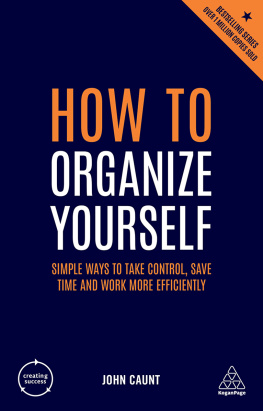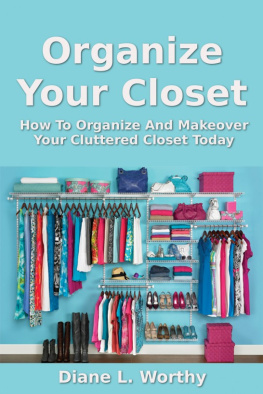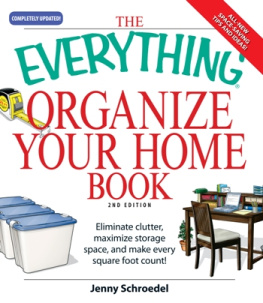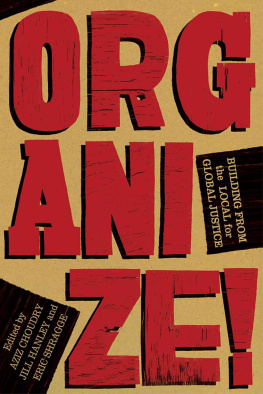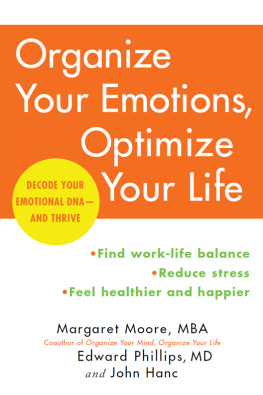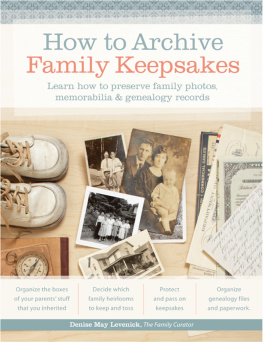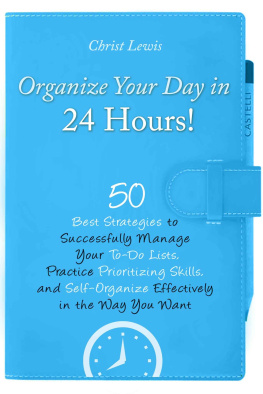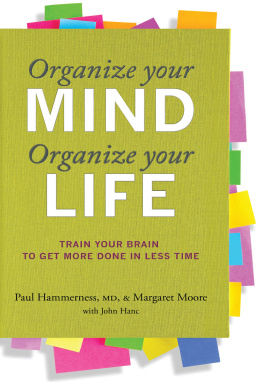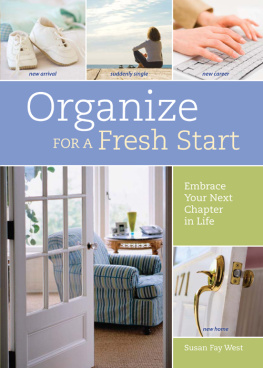Caunt - How to Organize Yourself
Here you can read online Caunt - How to Organize Yourself full text of the book (entire story) in english for free. Download pdf and epub, get meaning, cover and reviews about this ebook. year: 2019, publisher: Kogan Page, genre: Romance novel. Description of the work, (preface) as well as reviews are available. Best literature library LitArk.com created for fans of good reading and offers a wide selection of genres:
Romance novel
Science fiction
Adventure
Detective
Science
History
Home and family
Prose
Art
Politics
Computer
Non-fiction
Religion
Business
Children
Humor
Choose a favorite category and find really read worthwhile books. Enjoy immersion in the world of imagination, feel the emotions of the characters or learn something new for yourself, make an fascinating discovery.
- Book:How to Organize Yourself
- Author:
- Publisher:Kogan Page
- Genre:
- Year:2019
- Rating:3 / 5
- Favourites:Add to favourites
- Your mark:
- 60
- 1
- 2
- 3
- 4
- 5
How to Organize Yourself: summary, description and annotation
We offer to read an annotation, description, summary or preface (depends on what the author of the book "How to Organize Yourself" wrote himself). If you haven't found the necessary information about the book — write in the comments, we will try to find it.
How to Organize Yourself — read online for free the complete book (whole text) full work
Below is the text of the book, divided by pages. System saving the place of the last page read, allows you to conveniently read the book "How to Organize Yourself" online for free, without having to search again every time where you left off. Put a bookmark, and you can go to the page where you finished reading at any time.
Font size:
Interval:
Bookmark:

Dealing with Difficult People Roy Lilley
Decision Making and Problem Solving John Adair
Develop Your Leadership Skills John Adair
Develop Your Presentation Skills Theo Theobald
How to Manage People Michael Armstrong
How to Manage Projects Paul J Fielding
How to Organize Yourself John Caunt
How to Write a Business Plan Brian Finch
How to Write a Marketing Plan John Westwood
How to Write Reports and Proposals Patrick Forsyth
Improve Your Communication Skills Alan Barker
Successful Time Management Patrick Forsyth
Taking Minutes of Meetings Joanna Gutmann
The above titles are available from all good bookshops.
For further information on these and other Kogan Page titles, or to order online, visit www.koganpage.com .
Publishers note
Every possible effort has been made to ensure that the information contained in this book is accurate at the time of going to press, and the publishers and author cannot accept responsibility for any errors or omissions, however caused. No responsibility for loss or damage occasioned to any person acting, or refraining from action, as a result of the material in this publication can be accepted by the editor, the publisher or the author.
First published in Great Britain and the United States in 2000 by Kogan Page Limited as Organize Yourself
Fourth edition published in 2013 as How to Organize Yourself
Sixth edition 2019
Apart from any fair dealing for the purposes of research or private study, or criticism or review, as permitted under the Copyright, Designs and Patents Act 1988, this publication may only be reproduced, stored or transmitted, in any form or by any means, with the prior permission in writing of the publishers, or in the case of reprographic reproduction in accordance with the terms and licences issued by the CLA. Enquiries concerning reproduction outside these terms should be sent to the publishers at the undermentioned addresses:
2nd Floor, 45 Gee Street
London
EC1V 3RS
United Kingdom
www.koganpage.com
122 W 27th St, 10th Floor
New York, NY 10001
USA
4737/23 Ansari Road
Daryaganj
New Delhi 110002
India
John Caunt, 2000, 2006, 2010, 2013, 2016, 2019
The right of John Caunt to be identified as the author of this work has been asserted by him in accordance with the Copyright, Designs and Patents Act 1988.
ISBNs
Hardback978 0 7494 9896 2
Paperback978 0 7494 8479 8
Ebook978 0 7494 8480 4
British Library Cataloguing-in-Publication Data
A CIP record for this book is available from the British Library.
Library of Congress Cataloging-in-Publication Control Number
Names: Caunt, John, author.
Title: How to organize yourself : simple ways to take control, save time and
work more efficiently / John Caunt.
Description: 6th Edition. | New York, NY : Kogan Page Ltd, [2019] | Series:
Creating success | Revised edition of the authors How to organize
yourself, 2016.
Identifiers: LCCN 2018057322 (print) | LCCN 2018058144 (ebook) | ISBN
9780749484804 (Ebook) | ISBN 9780749484798 (pbk.)
Subjects: LCSH: Time management. | Personal information management. | Life
skills.
Classification: LCC HD69.T54 (ebook) | LCC HD69.T54 C39 2019 (print) | DDC
650.1/1dc23
LC record available at https://lccn.loc.gov/2018057322
Typeset by Hong Kong FIVE Workshop
Print production managed by Jellyfish
Printed and bound by CPI Group (UK) Ltd, Croydon CR0 4YY
Never have we experienced a greater need to be organized. The working environment of today is characterized by constantly rising pressure to deliver with fewer resources. Against a background of restructuring and cost-cutting we are expected to keep a larger number of balls in the air and to do so with less support. The picture is increasingly one of self-sufficient professionals responsible for all aspects of their workplace organization. The information age provides us with some of the tools to organize our working lives, but it also presents us with many new challenges in the form of increased volumes of information, constant connectedness, expectations of immediacy, and interruptions to our routines.
Outside our working lives, we have greater expectations of our leisure time, and we readily expect to be able to fulfil family commitments while we and our partners hold down demanding jobs. We juggle the different elements of our lives to cram in trips and excursions, duty visits, entertainment, house-keeping, health pursuits, personal development, voluntary responsibilities, family activities and time with friends.
To cope with all of this we need to be organized. We need to handle time, information, people and technology as efficiently and effectively as possible in order to deliver the results on which we will be judged. Being organized means:
less time spent firefighting and responding to crises;
sharper focus on the things that matter most in terms of producing results;
the ability to see your way through complex problems and challenges;
more time for family, friends and leisure;
reduced stress and fatigue;
greater sense of achievement;
the chance to step back and take pride in a job well done.
Even though the benefits of greater organization are clear, we present ourselves with excuses for failing to acquire them:
Excuse 1 The ability to be organized is something innate. Its a quality that you either possess or lack, and I just dont have it.
Certainly its true that we vary in our natural tendency towards being organized, but it isnt true that there is nothing we can do to overcome that inclination. Ever since the 1960s there has been a tendency within popular psychology to associate certain traits with a dominant role for one or other of the two brain hemispheres the left being judged superior for analytical functioning and the right for more creative tasks. Numerous questionnaires, inventories and personality profiles have reinforced the notion that attributes such as being organized are part of the way we are wired up, and that left-brain or right-brain dominance are fixed behaviour-determining features. But recent research has suggested such rigid categorization is erroneous, and revealed that all parts of the brain are engaged in activities that had previously been attributed to one or the other hemisphere. Its true you may not have a natural inclination towards being organized and methodical, but that just means you have to work a little harder at acquiring the necessary skills. And just in case you are wondering, Ill own up now to being a person who has to work quite hard at being organized.
Excuse 2 There is no way that I could be organized in this place. The constant interruptions, the crises, the disorganized colleagues.
Yes, there are plenty of workplaces where it is hard to be organized, but that is no reason to give up. In the chapters that follow we will look at how you can take control of your working environment to reduce interruptions and distractions, and well consider how good planning and effective delegation can help forestall crises and minimize colleague dependency.
Excuse 3 I would like to be more organized but Im just too busy to spend time on it at the moment. Perhaps in a couple of months time.
Font size:
Interval:
Bookmark:
Similar books «How to Organize Yourself»
Look at similar books to How to Organize Yourself. We have selected literature similar in name and meaning in the hope of providing readers with more options to find new, interesting, not yet read works.
Discussion, reviews of the book How to Organize Yourself and just readers' own opinions. Leave your comments, write what you think about the work, its meaning or the main characters. Specify what exactly you liked and what you didn't like, and why you think so.

